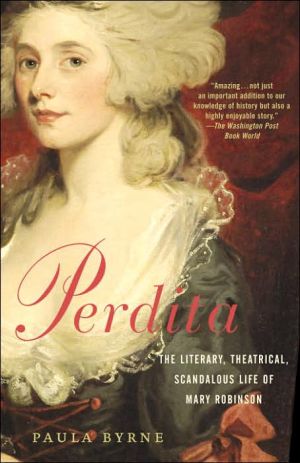

 |

|

The average rating for Perdita: The Literary, Theatrical, Scandalous Life of Mary Robinson based on 2 reviews is 3 stars.
Review # 1 was written on 2012-06-12 00:00:00 Shami Razak Shami RazakMary Robinson lived a very interesting life in very interesting times. Famous stage actress, first mistress of Prince George (later George IV aka "Prinny"), influential fashion icon & trend setter, political activist, proto-feminist, loving mother, and celebrated poet/writer, Mary (aka "Perdita" from one of her most famous stage roles) embodied the culture and pagentry of the 18th century English world. She was arguably a woman born ahead of her time. A woman who had a sense of who she was and what she wanted out of life and was able to capitalize on both her strengths (as well as her weaknesses) to make a name for herself. Her turnaround from young, naive actress to tawdry mistress of powerful men to respected author is almost unimaginable, and she did all this before her death in 1800 at the age of 43. Her beauty was legendary - by her mid-20's she had already been immortalized by Gainsborough, Reynolds, and other famous painters of the period. She introduced new fashions and almost single-handedly changed the style of female clothing from the tightly-corsetted and hoop-skirted designs of the mid-1700's to the flowing, body-freeing styles of the late 1700's and early 1800's. Not until the Victorian period would women's bodies be tortured again for the sake of fashion. Her views were radical for the time and for her sex, but she never waivered in them, even when it made her unpopular. She was an exceptional mother and daughter, keeping both near to her for her entire life and sharing close ties to many women of both high and low estate; from Georgiana, Duchess of Devonshire to an actress/prostitute friend fallen on hard times. Her relationships with men weren't so advantageous; her father and later her husband deserted her. Her lovers failed to keep their promises of protection and fidelity (although to his credit Prince George gave her an annuity for the rest of her life and stayed a friend to her). While still a young woman, she became crippled and was never able to walk again. At that point in her life, she determined to re-invent herself and re-gain respectibility by becoming a lady of learning and culture. Although her poetry and books aren't remembered today, she had fame and influence with her writing at the time. All in all, an enjoyable read, although I have to give it only 3 stars due to author Paula Bryne's ponderous and sometimes dry writing style. It took me a long time to get through this book - not because Perdita's life story wasn't fascinating (oh, it was), but because Byrne's writing wasn't fascinating. I think I would have really liked Perdita alot, and would now include her in one of my dinner-with-my-favorite-dead-historical-figures party (I wonder how she'd get along with the likes of Anne Boleyn, Laura Ingalls Wilder and Daniel Boone?...hmmm) |
Review # 2 was written on 2013-05-03 00:00:00 Lori Shiffman Lori ShiffmanOccasionally I have performed on stage. When that happened, the lights were so bright that I couldn't see beyond them, though one can hear the rustles and exhalations of a great crowd packed into a small space. How much tougher must it have been in the eighteenth century, when candlelight was the most powerful source of light--when it was easy to watch the people in the boxes watching you? This book was not only a meticulously researched account of a fascinating woman who, like so many eighteenth century female writers, was overlooked by male writers of history, except the salacious references to her amours, specifically with Prinny. Mary Robinson (later known as "Perdita" after she played in A Winter's Tale) began her career on stage. And what a time for the stage! Famous writers and actors, an enthusiastic audience and especially an enthusiastic press. In fact, the accounts of the morning papers' articles about performances, performers, and the puff pieces and responses by those same performers, reminds me of the interactions between artists and audience today, only instead of Twitter-fests, you had the caricatures printed overnight and posted in shop windows the next day, and those gossipy morning papers. Well, Mary Robinson, the sole support of a worthless husband at the ripe old age of twenty-two, caught the eye of the young prince who would eventually become Regent. According to her (she wrote up her autobiography, and in true eighteenth century fashion, managed to present herself as eternally young, frail, innocent, and pursued) she caught the eye of the seventeen year old prince, who was stunned by her beauty and talent, and who pursued her first with a secret correspondence. He signed himself as Florizel. According to the prince and his friends, she flirted with him from the stage, and pursued him via letter, becoming his Perdita. When they commenced their affair, she retired from the stage and paraded around town in the latest hot car, er, that is, carriage, but she had not given up her connections to the literary world. When the torrid affair cooled, and she found herself partially paralyzed, she started up a literary career that made her a famous name then, hobnobbing with the likes of Godwin and Sheridan, and supporting women in drama and writing. The book relies heavily on quotations from her letters and writings, from others, building a fascinating, complicated picture not only of a life, but a time. |
CAN'T FIND WHAT YOU'RE LOOKING FOR? CLICK HERE!!!